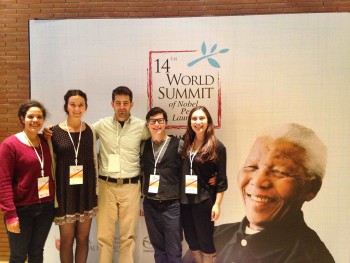Study Abroad Students Get Chance to Hear Nobel Laureates

From left to right, Elise Riley '16, Elisabeth Hawthorne '16, Brian Guggenheimer '16, Joaquin Vargas '16, and Elyse Adler '16 attend the 2014 World Summit of Nobel Laureates in Rome.
Photo courtesy of Elisabeth Hawthorne
Details
In recent years, Haverford College's Center for Peace and Global Citizenship (CPGC) has sent a contingent of four students to the inspiring World Summit of Nobel Peace Laureates.
In 2012, selected students went to Chicago. In 2013, they traveled to Warsaw, Poland. And last year, the summit venue was slated for spectacular Cape Town, South Africa. But the four CPGC-sponsored students who were selected to go never got the chance when politics intruded and the event was moved to Rome, Italy. Still, Haverford was well represented at the gathering. A group of five Fords studying abroad in Rome took full advantage of the unexpected once-in-a-lifetime opportunity.
Students at the three-day summit in December got to hear the likes of the 14th Dalai Lama, Mikhal Gorbachev, Bishop Desmond Tutu, and Lech Wałęsa as well as learn more about issues such as militarization, nuclear stockpiling, and children's rights.
“The summit reminded me how much I care about nonviolence as well as the elimination of weapons,” says Joaquin Vargas '16, an anthropology major with an Italian minor, who was one of those in attendance.“It also left me with a great message. Whatever it is you are passionate about, go out there and pursue it with an intense passion.”
One of his favorite experiences was a workshop with Jody Williams, a peace activist and founding coordinator of the International Campaign to Ban Landmines who won the Nobel Peace Prize in 1997.“The most important lesson I took away from the workshop was that nonviolence is the most effective and lasting way to eliminate the injustices of this world,” he says.
The summit was cancelled in Cape Town after several laureates boycotted the event over South Africa's decision not to grant the 14th Dalai Lama a visa.
“It was a real heartbreaker,” Parker Snowe, executive director of CPGC, said of his office's decision cancel the students' trip to South Africa.
For those Fords who attended in Rome, the summit overall was an opportunity to see the values of community, ethics, and justice espoused at Haverford displayed on a world stage, according to Vargas. It was“so affirming, inspiring, supportive and empowering, [and] reaffirming that such values are not limited and small but are important, worth pursuing and global.”
Elisabeth Hawthorne '16, an art history major who also attended the summit, says she found the experience inspirational, especially the talk by 2011 Nobel Laureate Tawakkol Karman, a journalist and human rights activist who spoke about her role in the Arab Spring.
“I found her to be an incredibly passionate and driven woman, who inspired me with her dedication to peaceful means of revolution and reform in government,” Hawthorne says.
She also enjoyed other speakers, and made note of a few of her favorite quotes, including Liberian social worker and 2011 Nobel Laureate Leymah Gwobee's message: "If you wake up in the morning and say, 'Mama, I have this great idea to change the world,' and if she reads it and her response is 'Girl (or Boy), are you crazy?!' you are on the right track."
One of the most moving and hopeful moments, Hawthorne says, came when Karman, the Arab Spring activist, and Shirin Ebadi, a lawyer and human rights activist who won in 2003, embraced on stage as a sign of reconciliation and solidarity.
“As Iranian and Yemeni women, Shia and Sunni, they asserted that religion was not the foundational cause of unrest in the Middle East, that the people loved and respected each other's differences and religious preferences, and that peaceful dialogue was desired,” she says. “It is indescribable, the emotion in the room at that time. I was not the only one brought to tears.”
—Lini S. Kadaba



